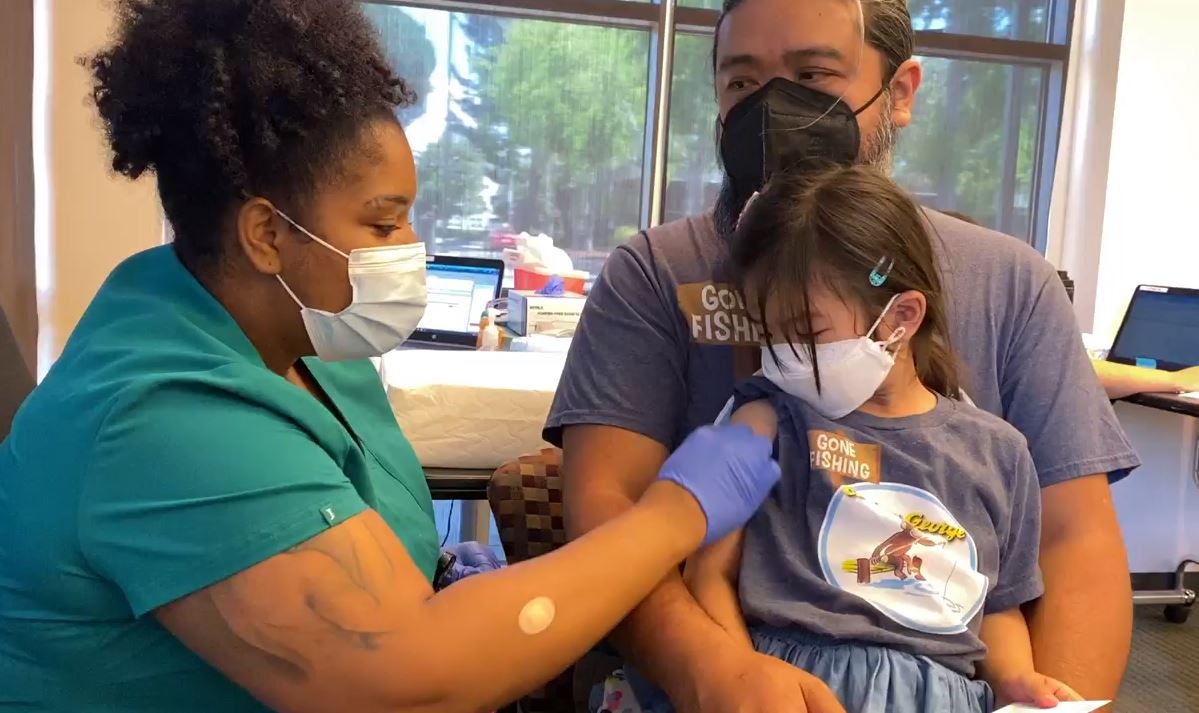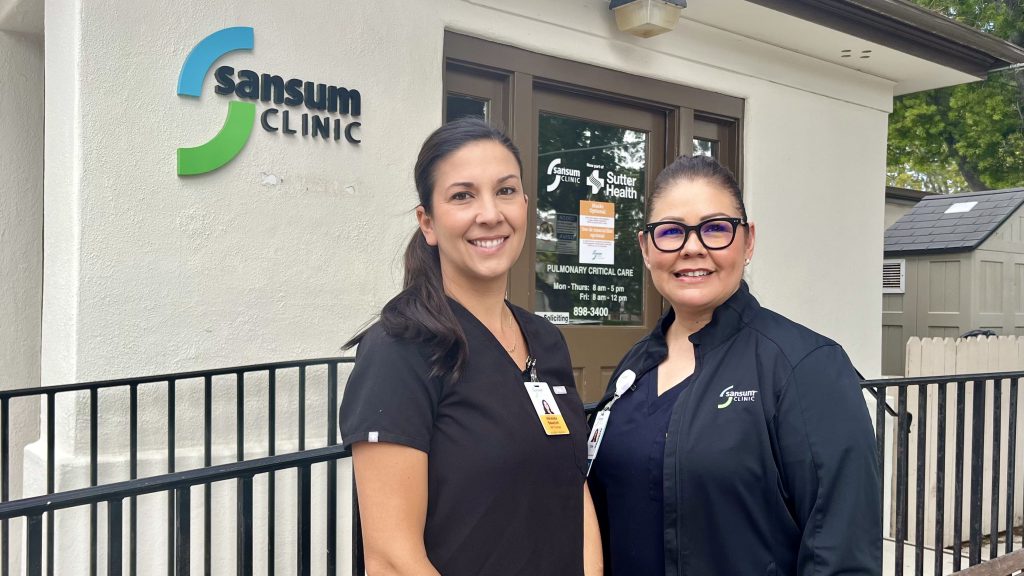The time has arrived for the United States’ arguably cutest cohorts – “the littles” ages 6 months to 4 years – to get vaccinated against COVID-19. As our nation’s final eligible group to receive the go-ahead, the announcement comes as a relief for many parents and caregivers who have eagerly awaited the ability to book their youngsters’ shot appointments.
“Getting a COVID-19 vaccine for your child is the best way to protect them against COVID-19 and its complications,” says Dr. Stephanie Chiang, a pediatrician with Sutter’s Palo Alto Medical Foundation and one of the medical advisors for the Sutter network’s COVID-19 Vaccine Task Force. “Adults, teens and older children have done their part, and now the youngest kids will have the opportunity to help protect their loved ones, their friends, their teachers and their communities.”
Dr. Chiang and her colleagues on the task force planned for months to safely administer the vaccine to the youngest children. At last, the preparation has begun paying off: One of the first vaccination clinics in the Bay Area was held at the PAMF Fremont Center for children aged 6 months to 4 years old.
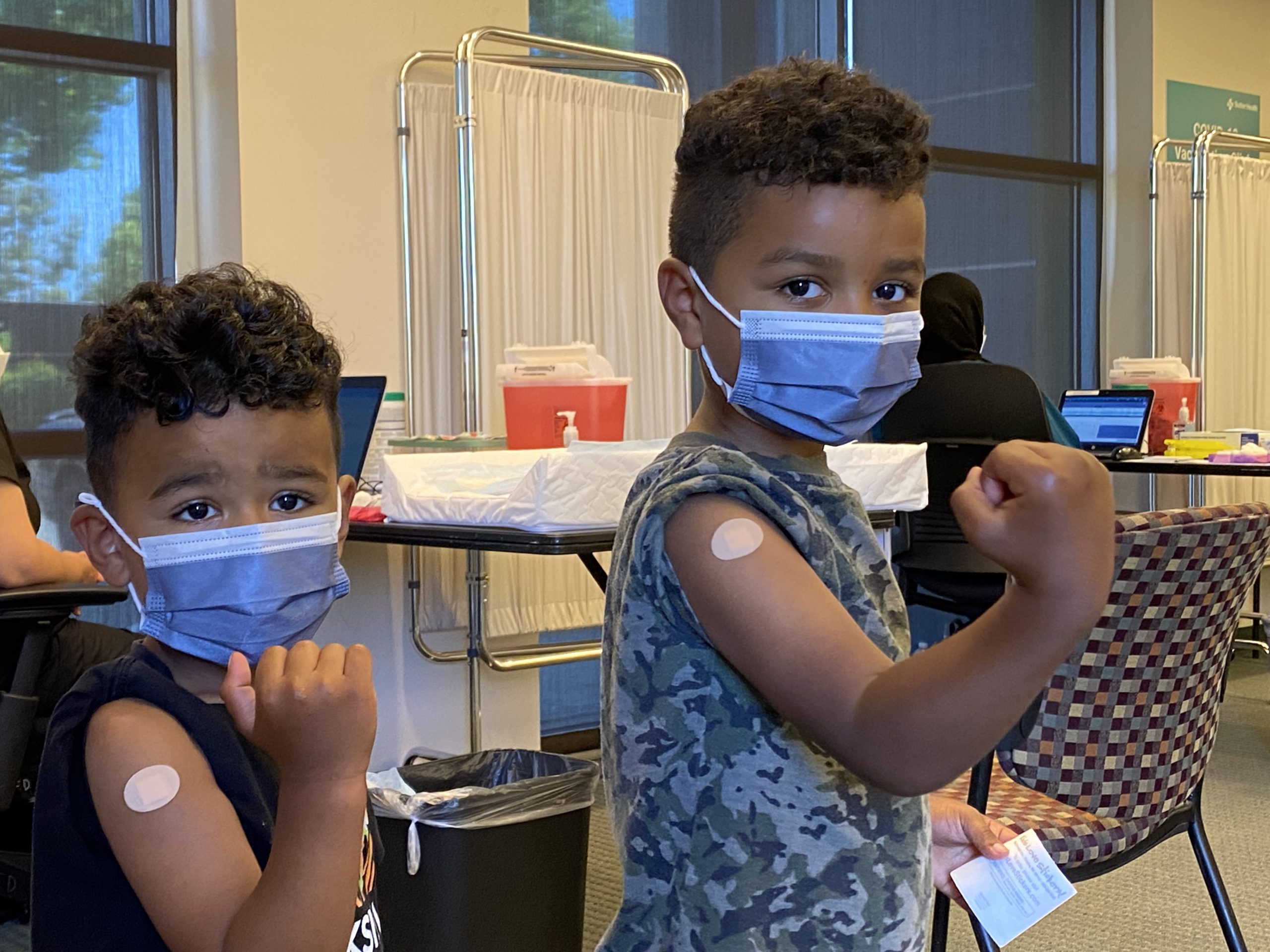
Knyght Chappelle, 3, (left) and brother Kyngston, 4, (right) display their strength after receiving their first COVID-19 vaccination at a Sutter Health vaccination clinic. (June 24, 2020)
According to the CDC advisory panel, which issued its recommendation following the FDA’s authorization in mid-June, the shots offer young children protection from hospitalization, death and possible long-term complications. The two approved vaccination options for this group are the Pfizer-BioNTech and Moderna pediatric vaccines.
The three-dose Pfizer COVID-19 vaccine can be given to children 6 months to 4 years of age, while the two-dose Moderna COVID-19 vaccine is recommended for children ages 6 months to 5 years. These doses were carefully studied and selected to ensure the vaccine is well-tolerated in young children. The trials also showed that those young kids who received these doses developed high levels of virus-fighting antibodies, which offer protection against the coronavirus.
A rollout months in the making
Sutter Health’s Vaccine Task Force, along with coordinating teams across the organization’s integrated network, have been working closely for months to prepare for the safe administration of vaccines for children 6 months and older. This has included comprehensive preparations for safe vaccine storage, handling and administration, as well as preparing to answer questions from parents.
“Our vaccine staff are ready to answer the questions parents and caregivers may have,” said Dr. Chiang.

Dr. Stephanie Chiang hosts a Zoom chat with media about COVID-19 shots for little kids ages 6 months to 4 years old.
Dr. Chiang says many parents are asking whether a child who has already had COVID-19 needs to be vaccinated, whether a child can get other vaccinations at the same time as the COVID-19 vaccine, and which vaccine – Pfizer or Moderna – would be best for their child?
In the case of prior infection, Dr. Chiang says the vaccines are recommended because, while prior infection does provide some protection against another bout of the virus, the child’s immunity can vary depending on how seriously ill the child was and how long ago they were sick. Studies in adults have found that vaccination can dramatically boost protection – sometimes referred to as “hybrid immunity.”
According to Dr. Chiang, kids can receive other vaccines such as the MMR, Polio or DTaP at the same time as they receive a COVID-19 vaccine.
The best vaccine, according to Dr. Chiang, is the one that’s available. But parents whose children are prone to experiencing stronger side effects from vaccination may want to look for Pfizer vaccine, which is administered in three lower doses and can result in fewer side effects. Parents who want their child to receive full protection sooner may opt for the Moderna vaccine, which only requires two shots, but each jab comes in higher doses. As a result, some children may experience more side effects.
Additionally, the CDC has said the known benefits of the COVID vaccination far outweigh the potential risk of having a rare adverse reaction to vaccination, including the possible risk of myocarditis or pericarditis. Since the U.S. vaccination campaign began in 2020, in very rare cases, vaccinated adolescents (mainly teenage boys) have developed inflammation of the heart muscle (myocarditis) or lining (pericarditis).
Similarly, the CDC has said it has found no evidence that the COVID-19 vaccine affects puberty or causes fertility problems in those vaccinated.
Risk levels for kids
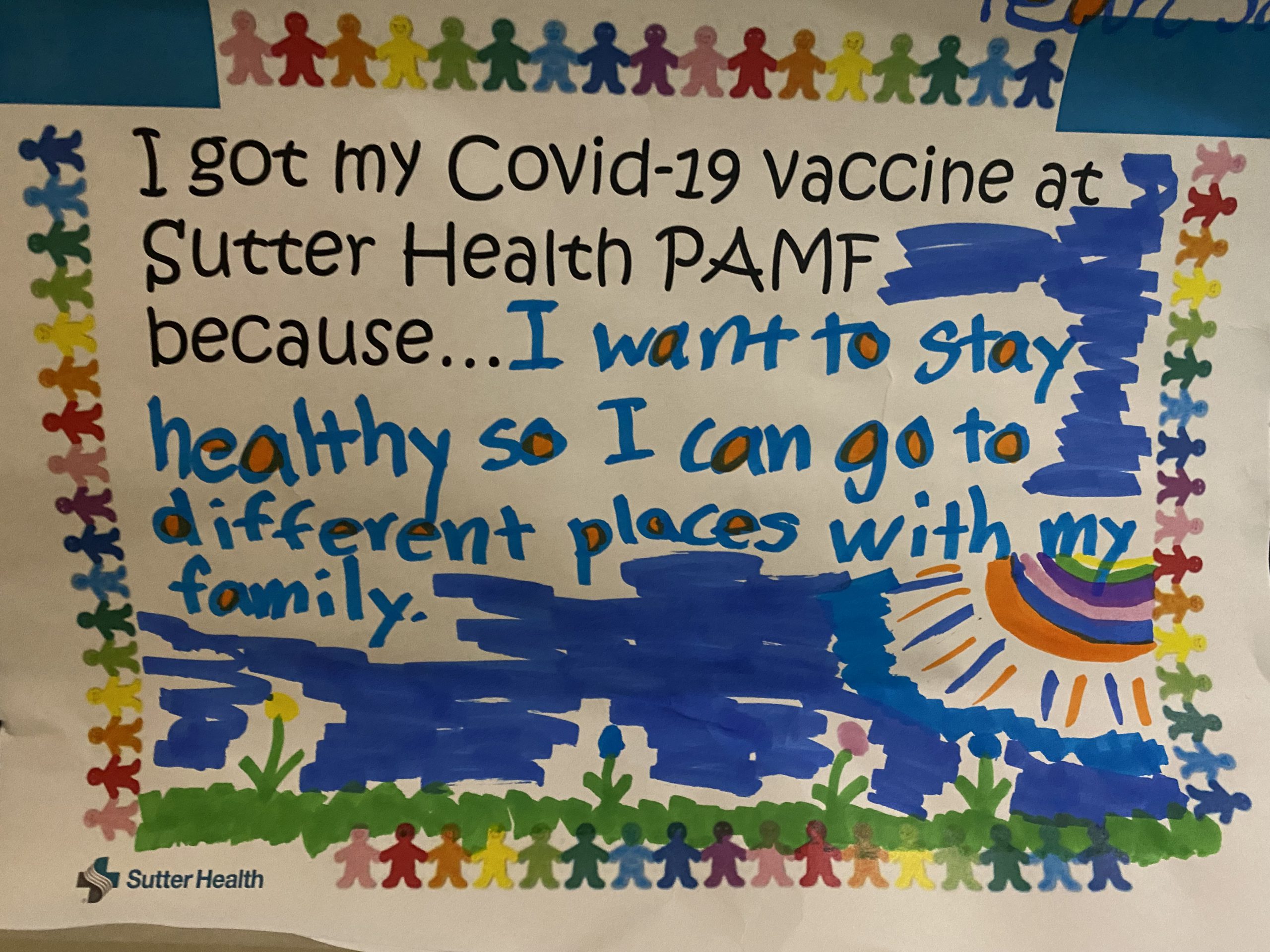
A colorful drawing is displayed at Sutter Health’s Palo Alto Medical Group vaccination clinic.
Everyone is at-risk for contracting COVID-19, and symptoms can be severe at any age.
Considering the more contagious omicron variant, children are at risk for contracting and spreading the virus to others, including older adults who have been shown to have worse health outcomes if contracting the virus.
While babies and young kids do seem to handle the virus better if they do get COVID-19, more than 8,300 kids have been hospitalized with COVID-19 since the start of the pandemic and more than 650 have died. Children with underlying medical conditions, too, are at an increased risk for developing more serious disease. These complications can include heart, lung or kidney diseases, weakened immune systems, or chronic illnesses such as obesity or asthma.
“As we’ve seen in adults, teens and little kids, it’s much better to get vaccinated than to actually get COVID-19,” says Dr. Chiang, who shares that the any side effects, if experienced, are typically fleeting.
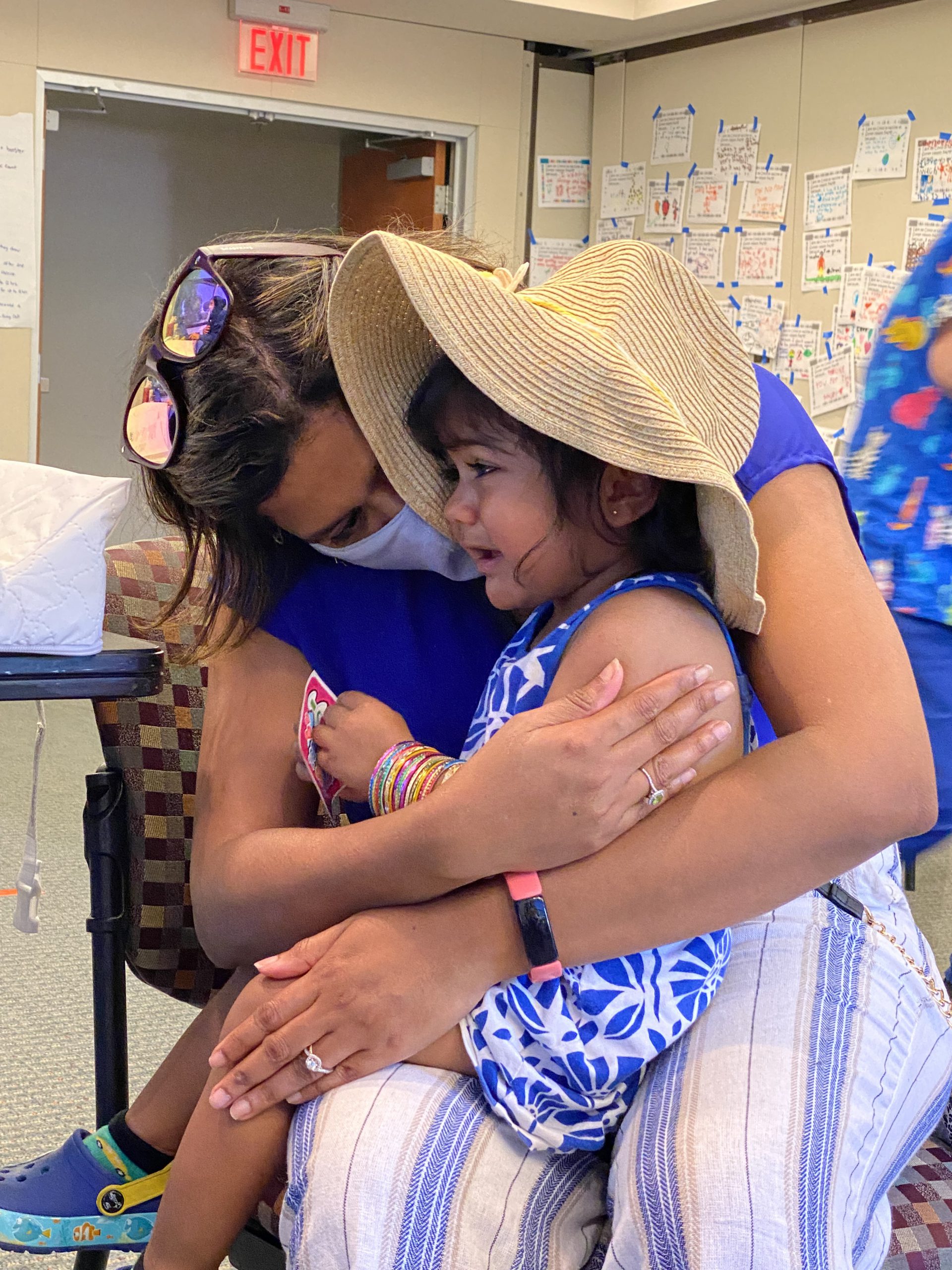
Perhaps “tears of joy” for Urvi Mutyal, 2, who received her first vaccination for COVID-19 this week following FDA and CDC approval. Mom Shraddha Mutyal comforts her baby girl with a warm embrace.
Side effects of COVID-19 vaccine in children are typically mild, brief, and similar to those experienced after routine vaccinations and include tiredness, fever, headache and muscle aches.
An end in sight?
While the COVID-19 pandemic has proved unpredictable, the medical community, including integrated health systems like Sutter, continue to remain on high alert.
“The good news is that there do seem to be signs that society is moving closer to the endemic stage,” says Dr. Chiang, who adds that “this may mean while COVID will continue to exist, we can coexist with it.” An endemic state could mean that COVID vaccinations are a part of routine vaccinations for all.
The bottom line: “Getting kids 6 months to 4 years old vaccinated is another big step in putting the worst of the COVID-19 pandemic behind us,” says Dr. Chiang.

